Namecheap VPN, a US-based provider, is affordable and speedier than most VPN services, but how is it in comparison considering other aspects? In this Namecheap VPN review, I’ll be testing and highlighting every aspect of the service.
A VPN is one of the modern go-to cybersecurity measures, but the software is only effective if it actually succeeds in overall performance. You’ll find many premium VPN providers in the market and even more on the App and Play Stores, but how authentic are they?
To test a VPN, you need to look at every aspect of the provider; where it’s located, what the server coverage is like, how the speeds are, and what security functions it offers. All this and more create the perfect VPN.
Keeping all that in mind, I’ll be testing Namecheap right down to the services it unblocks. To do that, I’ll be ticking off the boxes according to a rating criterion, which will be mentioned further ahead. But first, let’s take a look at Namecheap at a glance.
At a glance
| Base | USA |
| Price | $1.00/mo. |
| Servers | 1000+ servers across 70+ locations |
| Logs | No logs |
| Multi-logins | unlimited devices |
| Refund | 30-days |
| Recommended | Yes |
| Website | Namecheap.com |
In this chart, you’ll only see the basics or the skeleton outline of what Namecheap has to offer, but there’s a lot more you need to dig deep into. I’ll be mentioning a couple of points below, regarding what Namecheap VPN claims to offer and then scrutinizing/testing each further on. Here’s what the provider offers:
- Namecheap VPN is a US-based provider. It offers 1000+ servers across 700+ locations. I’ll be discussing the safety of its jurisdiction, and the reliability of its network.
- Compatible with streaming. Does not mention compatibility with P2P platforms. (Tested on a variety of services)
- Supports most operating systems and devices.
- Offers a 24/7 support team and live chat support. (Promptness discussed under reliability)
- Claims to provide ultra-fast speeds. (Tested further on)
- Operates with AES 256-bit encryption and other advanced features. (Discussed in detail)
Namecheap VPN Review 2020 – The rating guide
To understand a VPN software or any product in general, there’s always a rating guide to follow. For instance, if you’re looking for a pair of blue jeans, you’re not only looking out for the color blue but multiple other factors. You need to check the size, the material, the length, its durability, and appearance.
In the same way, testing the performance of a VPN depends on several factors. How else are you going to know whether Namecheap VPN is safe, fast, or even capable of unblocking services?
To put Namecheap VPN to the test, I used a rating guide to review its performance. A couple of tests were conducted and policies were scanned for accurate results. Here’s what the guide looks like:
- Pricing
- Location
- Security
- Streaming
- Speed
- Compatibility
- Reliability
Pricing – How affordable is Namecheap VPN?
Before investing or looking into VPN features, you always go straight for the price. This will give you a clearer idea of what all you’re going to get out of the service.
If the VPN is expensive, you’re going to expect more in terms of features and performance. However, if the VPN is affordable, this makes it a plus point. But, you still need to test the provider for successful results.
Namecheap VPN, in general, is known as one of the more affordable options. Here’s what the pricing plans look like:
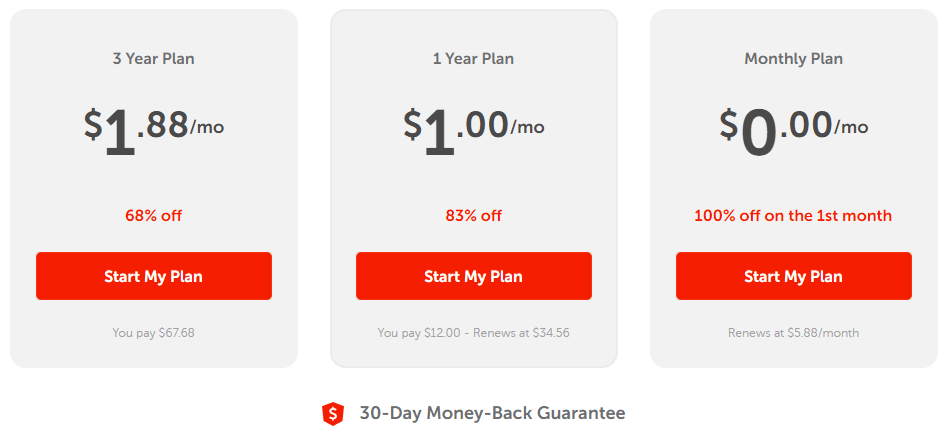
The Namecheap VPN prices break into 3 options:
- $0.00/mo. for the monthly plan
- $1.00/mo. for the 1-year plan
- $1.88/m0. For the 3-year plan
The prices are extremely affordable. Let’s discuss it a little more in detail. If you look at the 1-month plan, you should read the little text at the bottom of it. This means that after a 1-month free trial, your monthly subscription will renew to $5.88/mo.
The 1-year plan is a lot more affordable, but there’s a catch to it. It might be $12 for a year, but after the year ends, you’ll be charged $34.56 for a renewal.
The 3-year plan of $1.88/mo. remains the same. Regardless of the renewal prices being more than the start-up, it’s still way more inexpensive as compared to many other premium providers.
The Namecheap VPN 14-day free trial
The $0.00 monthly package serves as a free trial for subscriptions created through the website. Keep in mind, this trial only applies to the monthly plan and not for the other two packages.
The VPN, does, however, offer a 14-day free trial only for Android and iOS smartphones. This is only if the app if purchased through iTunes or Play Store, on the $0.00/mo. plan. Here’s a snippet from the FAQ knowledge-base on the website:

The Namecheap VPN 30-day money-back review
If you’re not willing to subscribe to the monthly package and require a test run, you could always do so using the refund period. Namecheap VPN offers a 30-day money-back guarantee on all subscriptions. However, you should always go through the services refund policy for a clearer picture of what’s allowed and what isn’t.
Namecheap VPN payment methods
This provider allows payments using the following methods:
- Credit Cards
- PayPal
- Bitcoin (for extra anonymity)
Location –Namecheap VPN jurisdiction safety review
Namecheap VPN is located in the United States. I’m not sure if you’re familiar with the 14-eyes alliance? They’re a group of countries that share common grounds with storing, stealing, sharing, or selling user information. This alliance is also the hub of all online surveillance, and the US is at the core of it all.
However, even though Namecheap is located within the alliance, it doesn’t necessarily mean they’re required to comply with the terms. It all depends on how steady they keep their grounds regarding the service’s privacy and no-logging policies.
Namecheap VPN location coverage – What’s served?
The quality and quantity of VPN server coverage are extremely important. There are some countries where most regional and international content is blocked. To access them, you need to be able to connect to a suitable server location to unblock them.
However, most VPN services cover a list of numerous servers but lack the ability to successfully unblock them.
In the case for Namecheap VPN, it has around 1000+ servers in 70+ locations. That’s more coverage than most VPN providers in the industry. However, to check its unblocking performance, it’ll have to be tested. You’ll find the results under the category of “Streaming”.
Does Namecheap VPN work in China?
We’re not sure.
There aren’t many VPN services that work in China. The censorship laws are pretty high and the Great Firewall of China is extremely difficult to get past. However, the results for various users have been different.
For some, it seems to work just fine, while for others, it failed terribly. I did contact the support chat, asking if any particular servers worked best for VPN users in China, here’s what they had to say:
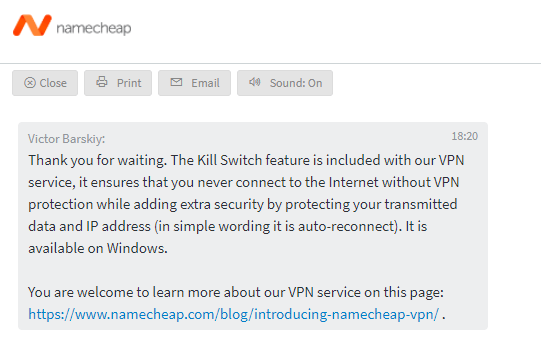
Although, if you’re still willing to give it a shot, you could always try unblocking services in China, using Namecheap VPN’s Scramble mode for OpenVPN connections. However, if you’re only looking to access websites and online privacy in China, there are other more reliable providers you can take a look at that work the best in China.
Security – Namecheap VPN features review
Besides Namecheap VPN being affordable, there are other factors to look into with great detail. The security features of a VPN tell you a lot about the provider and how much they put into creating secure passageways for their users.
Strong encryption and other advanced features are a must for any VPN provider. So, let’s take a look at what Namecheap has to offer.
Namecheap VPN encryption
A VPN needs to be secured with top-of-the-line encryption. Anything less would be considered unsafe. Luckily, Namecheap VPN runs on AES 256-bit encryption standards, which is considered to be the industry’s finest. You won’t have to worry about prying eyes or privacy issues.
Protocols
Apart from encryption, covering industry level encryption protocols are what’s required. The best at the moment is OpenVPN. It’s considered safe and speedy. Namecheap VPN offers only two protocols, OpenVPN and IKEv2, which are the best, but the list needs to be enhanced in the future.

However, you won’t find OpenVPN on the iOS app.
Kill Switch
A Kill Switch allows you to protect your privacy if ever the VPN connection drops midway. Namecheap VPN has a Kill Switch feature only on the Windows app. I double-checked with the support staff. Here’s what they had to say:
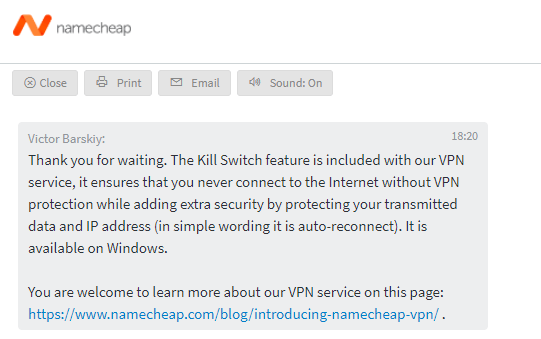
You’ll need to enable it manually in the settings.
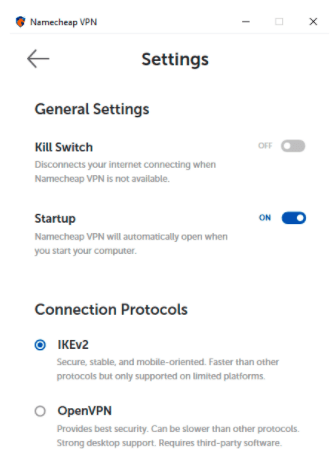
Scramble mode
This feature allows you to bypass censorships and restrictions in geo-blocked regions like China. It acts like a Stealth protocol, used within highly censored countries. You’ll be able to enable the feature using OpenVPN connections.
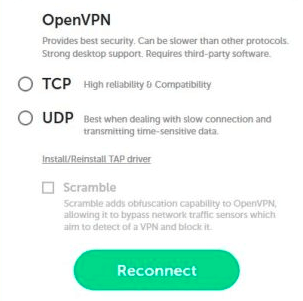
DNS protection
Namecheap VPN secures its own DNS protection, making sure there are no leaks.
Apart from these, there don’t seem to be any other advanced features like Split-Tunneling or an Ad-blocker. It encompasses security features suitable for extremely basic use.
Namecheap VPN leak test
Another part of security depends on if the provider leaks IP, DNS and webRTC. After conducting a few tests using various servers, the results were all clear. For the tests, I connected to the US, AUS, UK and Japan servers. This was to check the strength of locations from across the world. No leaks were detected.
Streaming – Can Namecheap VPN unblock Netflix?
Yes, it can.
As I mentioned above, a VPN needs to cover a qualitative and quantitative list of server locations. This allows users from any country to access streaming services, torrenting platforms, gaming apps, and more from anywhere in the world.
For instance, to access the US Netflix library, you need to connect to a US server since the service isn’t widely available. There are other streaming platforms like BBC iPlayer, Disney Plus, HBO, ESPN, Amazon Prime, Hulu, and more that aren’t accessible everywhere.
By connecting to a suitable server, you’ll be able to access them.
In the case of Namecheap VPN, I managed to unblock Netflix, HBO, and Disney Plus but wasn’t able to access BBC iPlayer even after multiple tries. I’m not a hundred percent sure about the other services, as they haven’t been tested as yet. For results, you should look up other user reviews.
What about torrenting? Is Namecheap VPN P2P compatible?
If you take a look at the website, you won’t be able to find much or any information regarding their P2P compatibility. However, after tested a few platforms, I can say that Namecheap VPN does work with unblocking them. However, for the safer side, it’s always better to use known torrenting VPNs for smooth and secure access.
Speed – The Namecheap VPN speed test review
What good is streaming and torrenting allowance if the speeds are low? It’s a known fact that ISP always manages to throttle with internet speeds and limit bandwidth. A VPN can help stabilize the speeds, keeping them consistent.
To test the speed after connecting to Namecheap VPN, I connected to a few servers that are widely preferred, mainly for unblocking international streaming services.
I ran the tests on speedtest.net and connected to the US, AUS, CA, and UK servers. The results I got were compared to my local internet speeds without the VPN, which were 32Mbps Download and 29Mbps on Upload.
The following results after connecting to the VPN servers were as follows:
| US | 28.92Mbps |
| UK | 28.60Mbps |
| CA | 26.68Mbps |
| AUS | 20.77Mbps |
The speed results for each were decent enough for streaming HD and 4K content. The only noticeable drop was in the Australian server.
Compatibility – Namecheap VPN device support review

Apart from security, speeds, and unblocking abilities, you need to go through a VPN service’s device support. Not everyone needs VPN protection for phones and not everyone needs it for a desktop. A VPN needs to support multiple platforms as well as allows multiple device connections.
Any solid VPN provider needs to support all the major operating systems. Some of the major ones include Windows, Android, iOS, macOS, Firestick, Linux, Nvidia Shield, Roku, and more.
With that said, let’s review the Namecheap VPN device compatibility.
- Windows
- Android
- iOS
- macOS
- Linux
- Routers
Besides supporting the major apps, another important aspect to look for is user-friendliness. Luckily, Namecheap VPN is simple to navigate and easy to install. For connection to routers, you need to make sure that it supports OpenVPN.
Does Namecheap VPN allow multiple device connections?
Yes, it does.
One of the best attributes Namecheap VPN possesses is the fact that it’s not only inexpensive but also allows you to make unlimited and simultaneous device connections. It used to cater up to only 5 devices, but with the latest update moved on to unlimited.
Namecheap VPN Windows app review
Most Namecheap VPN users go for the Windows app, since it contains the most features. The app itself is simple to install, mostly because there aren’t many settings you can toggle with.
The only settings and features available to you will be to choose between protocols (OpenVPN and IKEv2), enable the Kill Switch, and enable the Scramble feature after connecting to OpenVPN.
Once you sign in to your account, you’ll see the main screen of the app, with multiple server locations to choose from, along with the “Connect” button. Unlike most VPN providers, Namecheap VPN has a drop-down menu for the locations along with their ping time. This way you can see a server most suitable for you according to where you’re physically located.
Reliability – Namecheap VPN safety review
After going through the entire Namecheap VPN review, what have you thought about it so far? Did you think that the VPN delivered justifiably in performance?
According to me, I feel the security is strong but basic, the speeds are great, unblocks a few streaming services, server coverage is decent, but there’s still more to look into. The safety of a VPN depends also on the provider’s privacy policies, its support chat and other factors.
So let’s see where Namecheap VPN stands in reliability:
Does Namecheap VPN log user data?
It’s not clear.
Before investing, I always look into the logging policies. Privacy always matters, and a VPN is supposed to respect it by keeping its user’s data secure and unlogged.
As far as Namecheap VPN’s logging policy goes, there’s not much detail on it. Their logging policies state the kind of information collected, which goes up to IP addresses, bandwidth, timestamps, emails, accounts etc. However, it does mention that the information collected is solely at the discretion of it users.
Then there’s also the point of the provider being under the 14-eyes jurisdiction, which to me doesn’t seem too safe. But in the end, the company does state a strict no-logging policy.
For those users who require basic use of the VPN, this might not be considered as very alarming. As for those who wish to keep completely anonymous, there are still other providers like Surfshark. It covers both a privacy-friendly region and a strict no-logging policy.
Support chat and support center
Namecheap customer support breaks into four segments:
- Live chat
- FAQ
- Knowledgebase
- Tickets
Out of all this, I found the live chat the most useful for on-hand queries that don’t take 24 hours.
It is because Namecheap VPN offers services other than a VPN that their support center (FAQ sector) is a little confusing. There aren’t many answers that cover up commonly required questions and contain blogs with outdated information.
The support chat is live and around the clock. However, it seems that their support agents need to be on the same page. I spoke to a total of four agents, and each provided me with different answers or links. Probably just one of them were helpful. I think this area needs to be revised since there are many customers and users looking for assistance that a blog might not provide.
To conclude – What’s the verdict?
All-in-all, after going through the entire review, I believe Namecheap VPN to be extremely resourceful for basic VPN users. It has good server coverage, great speeds, unblocks limited services, and covers basic security and device compatibility. The jurisdiction is still a little bit of a red flag only because of the vague privacy policies.
For those who prefer an affordable and basic provider, then I recommend Namecheap VPN. But, if you’re looking for a solid heavy-usage VPN, I recommend Surfshark.
